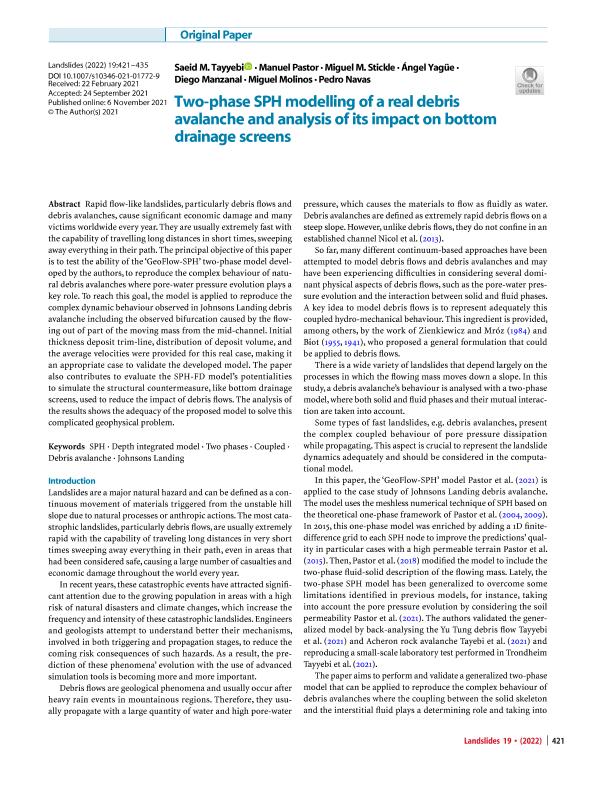Mostrar el registro sencillo del ítem
dc.contributor.author
Tayyebi, Saeid M.
dc.contributor.author
Pastor, Manuel
dc.contributor.author
Stickle, Miguel M.
dc.contributor.author
Yagüe, Ángel
dc.contributor.author
Manzanal, Diego

dc.contributor.author
Molinos, Miguel
dc.contributor.author
Navas, Pedro
dc.date.available
2023-10-02T15:11:50Z
dc.date.issued
2022-02
dc.identifier.citation
Tayyebi, Saeid M.; Pastor, Manuel; Stickle, Miguel M.; Yagüe, Ángel; Manzanal, Diego; et al.; Two-phase SPH modelling of a real debris avalanche and analysis of its impact on bottom drainage screens; Springer Heidelberg; Landslides; 19; 2; 2-2022; 421-435
dc.identifier.issn
1612-510X
dc.identifier.uri
http://hdl.handle.net/11336/213783
dc.description.abstract
Rapid flow-like landslides, particularly debris flows and debris avalanches, cause significant economic damage and many victims worldwide every year. They are usually extremely fast with the capability of travelling long distances in short times, sweeping away everything in their path. The principal objective of this paper is to test the ability of the ‘GeoFlow-SPH’ two-phase model developed by the authors, to reproduce the complex behaviour of natural debris avalanches where pore-water pressure evolution plays a key role. To reach this goal, the model is applied to reproduce the complex dynamic behaviour observed in Johnsons Landing debris avalanche including the observed bifurcation caused by the flowing out of part of the moving mass from the mid-channel. Initial thickness deposit trim-line, distribution of deposit volume, and the average velocities were provided for this real case, making it an appropriate case to validate the developed model. The paper also contributes to evaluate the SPH-FD model’s potentialities to simulate the structural countermeasure, like bottom drainage screens, used to reduce the impact of debris flows. The analysis of the results shows the adequacy of the proposed model to solve this complicated geophysical problem.
dc.format
application/pdf
dc.language.iso
eng
dc.publisher
Springer Heidelberg

dc.rights
info:eu-repo/semantics/openAccess
dc.rights.uri
https://creativecommons.org/licenses/by-nc-sa/2.5/ar/
dc.subject
COUPLED
dc.subject
DEBRIS AVALANCHE
dc.subject
DEPTH INTEGRATED MODEL
dc.subject
JOHNSONS LANDING
dc.subject
SPH
dc.subject
TWO PHASES
dc.subject.classification
Otras Ingeniería Civil

dc.subject.classification
Ingeniería Civil

dc.subject.classification
INGENIERÍAS Y TECNOLOGÍAS

dc.title
Two-phase SPH modelling of a real debris avalanche and analysis of its impact on bottom drainage screens
dc.type
info:eu-repo/semantics/article
dc.type
info:ar-repo/semantics/artículo
dc.type
info:eu-repo/semantics/publishedVersion
dc.date.updated
2023-07-07T23:03:52Z
dc.journal.volume
19
dc.journal.number
2
dc.journal.pagination
421-435
dc.journal.pais
Alemania

dc.journal.ciudad
Heidelberg
dc.description.fil
Fil: Tayyebi, Saeid M.. Universidad Politécnica de Madrid; España
dc.description.fil
Fil: Pastor, Manuel. Universidad Politécnica de Madrid; España
dc.description.fil
Fil: Stickle, Miguel M.. Universidad Politécnica de Madrid; España
dc.description.fil
Fil: Yagüe, Ángel. Universidad Politécnica de Madrid; España
dc.description.fil
Fil: Manzanal, Diego. Consejo Nacional de Investigaciones Científicas y Técnicas. Oficina de Coordinación Administrativa Houssay. Instituto de Tecnologías y Ciencias de la Ingeniería "Hilario Fernández Long". Universidad de Buenos Aires. Facultad de Ingeniería. Instituto de Tecnologías y Ciencias de la Ingeniería "Hilario Fernández Long"; Argentina. Universidad Politécnica de Madrid; España
dc.description.fil
Fil: Molinos, Miguel. Universidad Politécnica de Madrid; España
dc.description.fil
Fil: Navas, Pedro. Universidad Politécnica de Madrid; España
dc.journal.title
Landslides

dc.relation.alternativeid
info:eu-repo/semantics/altIdentifier/url/https://link.springer.com/article/10.1007/s10346-021-01772-9
dc.relation.alternativeid
info:eu-repo/semantics/altIdentifier/doi/http://dx.doi.org/10.1007/s10346-021-01772-9
Archivos asociados
